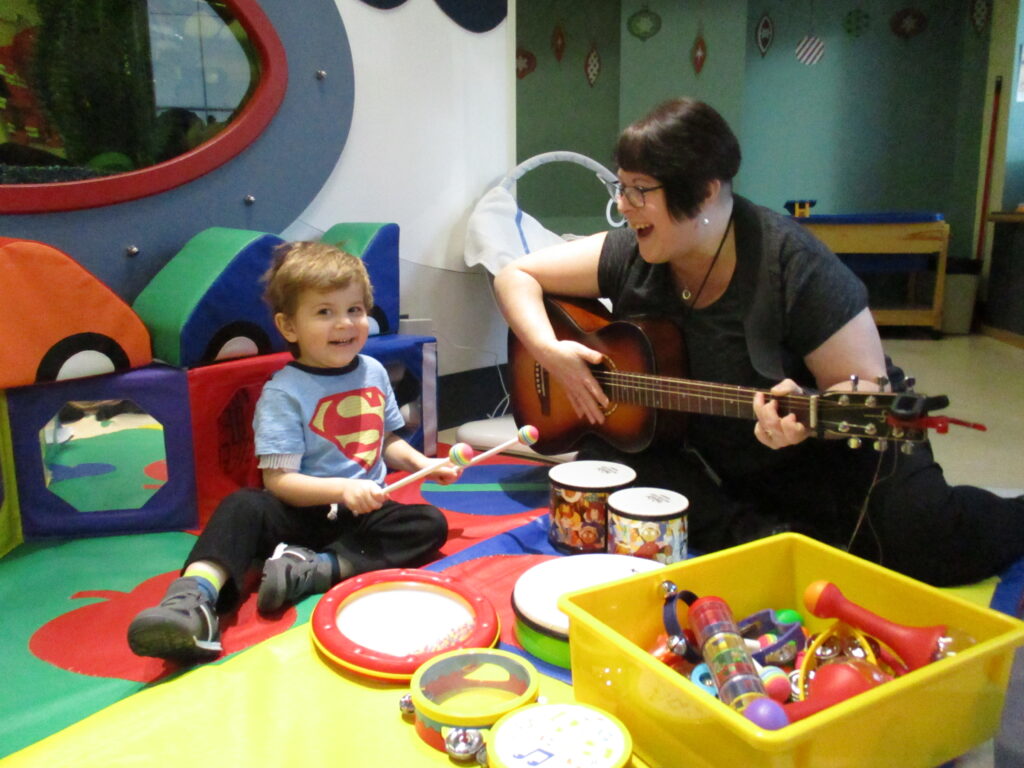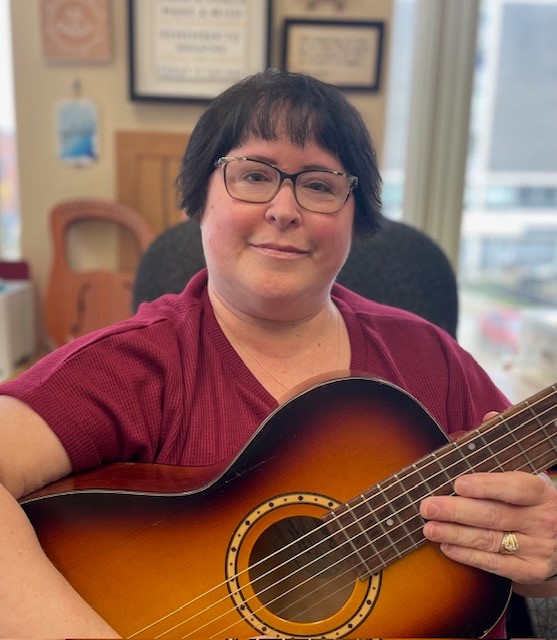In honour of Allied Health Week 2024, HSC Children’s Hospital Certified Music Therapist Cecilia Bellingham took time to respond to our questions about her love of music, her life as the founding Music Therapist at Children’s, and the incredible science behind music therapy. It has been wonderful to learn all about the level of specialization, the impact and compassion of those working in this discipline. Thank you, Cecilia!
“My family knows that if I won the lottery tomorrow, I would still be working in some capacity! I love my job but I also enjoy spending time at our cabin in Grand Marais, taking care of our two dogs and cat now that my two girls are grown. I also love to read and, of course, make or listen to music!”
– Cecilia Bellingham
QUESTION 1: Tell us about music therapy. What are the effects of music therapy?
As trained music therapists, we use music to try to improve the lives of the people we work with. This could include restoring a sense of balance in terms of physical, emotional and mental health. The relationship the person cultivates with the music and the music therapist are imperative to the process. Music therapists have all of the qualities of music at their disposal…melody, rhythm, tempo in order to tailor the experience for the individual.
In our training, we are taught to assess, set goals and objectives and to determine a plan. Within a hospital setting, we assess affect, body language, communication, ways of coping, ability to move, tolerance to activity and indicators of stress behaviours, for example.
When patients are hooked up to monitors, we can also observe and note the physiological signs related to illness and to skillfully use music to have a positive impact on the oxygen saturation, heart rate and rate of respiration. In fact there have been a handful of times when I have sung to a patient in the Pediatric Intensive Care Unit and the nurse has noted that the child’s heart rate and rate of respiration decreased during the music. In these instances, it was more than just the music at work, because I also had previously worked with these patients, and therefore I sung the songs that they usually loved and responded to.

QUESTION 2: Tell us about what it’s like working at Children’s.
At HSC Children’s Hospital, we have the privilege to work with infants, children, teens and their families. We provide music therapy at the bedside on all of the inpatient units and we also provide group experiences in certain areas.
In our sessions, we try to give patients choices…choices of songs, instruments, level of participation, changing lyrics, choice of music activities, learning an instrument or writing a song for example. To promote choice-making through a safe outlet within an environment that does not function on personal choice is important for children and teens and their development. They are a child or teen FIRST before they are a patient with a illness or disease.
“In order to do our best work at the hospital, we have to be focused within the moment and what our intention is for the patient and the session. This is the essence of our work. Whether it is to relax an irritable infant who is weaning off narcotics, or to provide comfort and structure while singing and rocking to a child whose little world has been turned upside down due to trauma, disease, illness or separation from family…it is important to the health and well-being of every patient we see!“
Even if I have to sing Twinkle, Old MacDonald or Baby Shark 20 times a day, then that is what I must do to try to get a glimpse of the child’s first smile while being in hospital, or to see them move or rock to the music. Children naturally respond to music without judgment and/or criticism. I have always felt that it is rewarding to witness the resilience of a child. It is a life lesson that we get to observe on a daily basis within the landscape of healthcare.
QUESTION 3: Tell us about your career path.
“Over the years, I have worked extremely hard to gain the trust and respect of members from the health care team. The nursing staff appreciate when we can relax, distract or provide gentle stimulation to patients. We are also extra eyes and ears. We also appreciate when staff delay their ‘task’ because they see how the child is benefitting from the music therapy session. In this way, the child always wins!”
I have been a music therapist for 26 years! It is easy for me to remember because I started my career by creating the music therapy program here at HSC Children’s. I have a Bachelor of Music from the University of Manitoba and then I completed my Bachelor of Music Therapy from the Open Learning University in British Columbia.
My main instrument is actually the violin, but I use guitar, voice and rhythm instruments in my work at the hospital. To my surprise within the last few years, I have even met some teens who have played the fiddle, so I have been able to put my skills to use and of course there are many interested in learning guitar or ukulele, so I am able to support that as well.
I was fortunate to have completed my internship here at HSC Children’s and thereby had the opportunity to demonstrate how music therapy could contribute to the health and wellness of little patients within the existing framework and programming at the hospital. It was my passion to work here and I received positive support and feedback from families, managers and administrators to apply for grants to begin the program. I was able to begin with my dream job as a new grad and I am still as passionate now about the work as I was back then!
QUESTION 4: Tell us about the Music Therapy team.
Currently there are two of us working in pediatrics (including Lacey Friesen, profiled also in time for 2024 Allied Health Week) and there is one music therapist working in mental health at HSC. We are very fortunate to not work in isolation as many other music therapists must do in other settings. There is something to be said when you don’t have to explain or defend what you do because the other music therapists just understands. I think the only other facility in Manitoba that would have more than one music therapist would be St. Amant Centre.
QUESTION 5: I assume you love music – where did that love come from? What instruments do you play; what are your favourite types of music?
I grew up in a musical household with my dad playing fiddle. I chose to switch from taking piano lessons to violin lessons at the age of eight. My twin sister and younger sister were both musical too, but I seemed to gravitate to it as an outlet of expression. I also learned to play the clarinet and bass guitar through my school years.
“If you were to ask me now what my favourite instrument would be, I would say my voice. Once I learned guitar and became competent enough to accompany myself, it opened up a whole new world for me. It is that connection that I try to inspire and/or share with others, whether it be for the benefit of patients, families and/or staff. Currently, I am trying to teach myself how to play the cello as it is on my bucket list!“
I listen to a variety of music. Pop, rock, hip hop, R &B, country, classical. I will listen to just about anything and everything. It is helpful that I still listen to most of the music that is requested by the teens at the hospital. It is much easier to earn their trust and respect if you can pull off a believable version of “Hotline Bling” by Drake or “Numb” by Linkin Park.
I have always preached to my music therapy students and interns over the years, that you have to try to emulate the style of music, the sound of the vocals/band to convey the essence of the song in order for teens to ‘buy into’ what you are doing, especially when you may only see them once! You have to try to make every minute or ‘note’ count!
HOW TO TRAIN TO BE A MUSIC THERAPIST
In Canada, there are undergraduate and graduate music therapy training programs, including in Manitoba at the Canadian Mennonite University. The four-year undergraduate degree consists of music history, music theory, psychology and clinical music therapy courses. In addition to the academic courses, four practicum placements and a 1000-hour internship are part of the degree.
Upon completion of the degree, candidates are eligible to take the board exam and become a certified music therapist. The national organization, the Canadian Association for Music Therapists (CAMT), supports music therapists to maintain professional standards of practice, abide by a Code of Ethics and to fulfill continuing education credits to maintain certification.

